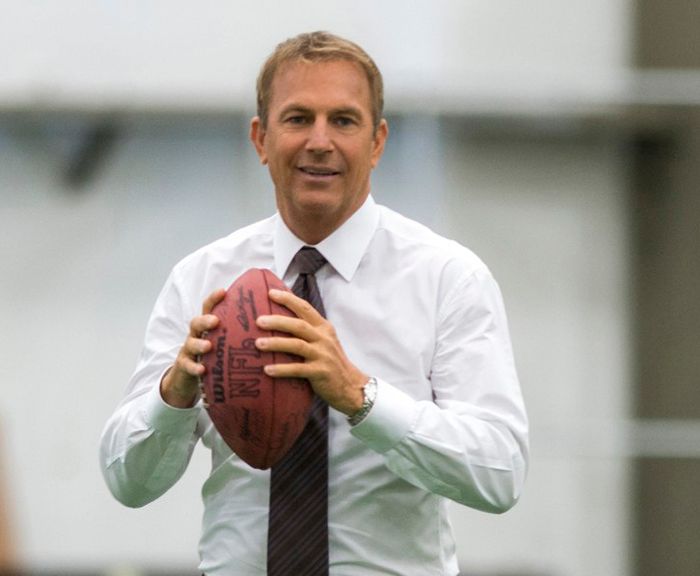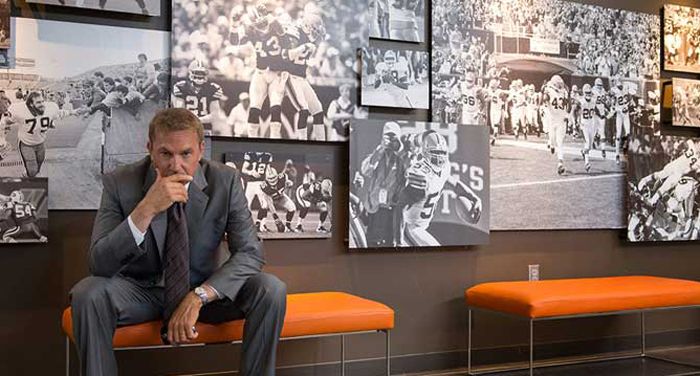There are few luminaries from the world of comedy with as venerated a body of work as Ivan Reitman. From Meatballs and Stripes to Ghostbusters and Dave, Reitman’s work has offered audiences extraordinarily sharp humor, paired with smart, sympathetic characterizations and packaged with terrific storytelling and superlative directing.
But the filmmaker characterizes his latest film, Draft Day, as a mystery, as it follows the Cleveland Browns’ general manager as he negotiates a deal that just might land his team at the Super Bowl at the end of the season. Starring Kevin Costner, the film is as non-nonsense as its leading man, but it balances humanistic comedy with the suspense of maneuvering, wheeling and dealing that would make a political thriller seem tame.
Reitman spoke with Spinoff Online at the recent Los Angeles press day for Draft Day, where the filmmaker revealed why he took the project, and what he had to go through to make it. Additionally, he offered insights into the virtues of working with an equally established leading man in Costner, and reflected on the changes he’s seen occur in the industry – and comedy as a whole -- since his 1980s heyday.
Spinoff Online: In adapting the script, what to you was most important in managing this chess game that’s about the characters, but it also involves the almost mystery of what this guy’s going to do to make everything work in the draft?
Ivan Reitman: For me it was a bit of a mystery story. And certainly it was a suspense movie. That was the genre for me. It’s more of a suspense movie that happens to take place in a sports related world. It’s not even about a sporting event, although you can call the draft a sporting event, and it is. And we play it as a sporting event. [But] I came into it very early. I read a very early draft of the script and was one of the first people outside of the writers to have read it. And I just responded to it immediately and I knew before I turned the last page that I was going to direct it. I met with the writers literally two days after I read it and said, “I really like the script. I’m going to make it.” And we made some revisions in the story and I got Paramount to buy it. And then when we finally handed in the final draft that was ready to go and budgeted it and had Kevin Costner, they decided they weren’t going to make it. And it was put into turnaround and after some stress we were able to get Lionsgate to make it. So that’s the sort of overview of the business side of it.
Creatively, I knew that for me to pull it off I had to have great performances from a great ensemble. So I was very careful in the casting. And I knew that I was going to have to purposefully be more visually inventive in a relatively enclosed insular world. My other films are really visually interesting, but people don’t pay attention to it because the focus is on performance and comedy – and being too fancy in a comedy seems to distract from comedies, in my experience. And here I really needed something that, in a story with 16 phone calls, I needed to make those phone calls different and come alive and I had to make these actors in two different geographical places appear to be at the same time, in the same place in a kind of effective visual manner that wasn’t simply, you know, Rock Hudson and Doris Day in a Ross Hunter movie. And so that’s sort of where that whole idea sort of started to develop in my brain.
Review: "Draft Day" is Reitman's Best Film in Many Years
Kevin Costner’s character clearly has enough presence of mind to understand that he is emotionally closed off, but at the same time like he can’t be open. What do you have to do and how much do you just rely on Kevin as the performer to bring the dimensionality of those two dynamics?
A lot is relying on the right actor, and Kevin is the right actor for this part. And you try to keep a clarity of tone in that, and I’ve been doing it a while. I have a sense of how to speak to actors including movie stars, which is a whole other kind of form of actor. And I had a real sense of what makes him strong and what is ineffective. And I just try to do my best to keep that going for him so that he’s comfortable. It’s a tough part because he’s got these big speeches where it’s not dialogue, where he actually just has to get through a couple of paragraphs, make sense of it so we understand it, so a non-fan can understand it, and then place it emotionally in the right place in the movie. But that’s normal for film acting. It’s normal for film directing. And people who can do that well turn out pretty good movies and who don’t, don’t.
You mentioned how this had a rocky start, but you and Kevin both are known so strongly for the work that you did in the ‘80s and ‘90s. What advantages are there in being a more seasoned filmmaker working with a more seasoned actor in a new era? Are you a little bit more of an unknown quantity coming in to execute this, or is it just a matter of having the expertise and this being easier?
As soon as we met, we were very confident in each other. I think we had gone through a lot of wars on our own that we recognized and we reminisced quite a bit about our careers. We spent about 24 hours solid together – I went up to Aspen and stayed at his house and just chatted, mostly about the movie but chatted about our lives and what we wanted this moment out of continuing to make films. And I think we became very comfortable with each other just immediately through that process and he realized I was a straight [shooter] – I mean, you know he’s a straight shooter from watching his movies. And from speaking to me he realized that I was someone that he could probably trust, you know. I had to win it over the long process, but then he had some notes on the script and we were improving the script with or without his notes. And so there was this process for a few months of the script sort of getting – and it got better. And he saw that it got better and better and that really made him feel comfortable about the whole thing. And we just hung out a bunch of times. That’s really how it all started. I really like him as a kind of a human being and I think he likes me. We became friends which you don’t often do with people that you work with. You think you’re friends but you’re really, you know, in a professional close relationship that takes a lot of time and then it sort of goes.
Reitman on What His "Ghostbusters 3" Would've Been, Why He's Not Doing It
How do you feel like either audiences or maybe even comedy in general has changed or evolved from like the days of your heyday, your earliest films?
Well, I just got this award from NATO literally two nights ago when Seth Rogen and his partner Evan Goldberg were showing a bunch of clips from their movies – and it was kind of shocking how vulgar the clips were, and really funny, but way more vulgar than anything we did in Animal House, which, you know, people were shocked by, or in Stripes or any of those. Or certainly Ghostbusters was really a family movie. And so I know it all grew, but we made that sort of important step from the sort of war generation to the post-war generation. But this is like a whole other thing and it was just fascinating to see. I think there seems to be less joy and sweetness in some of the films. I think they’re really funny, but they don’t seem to be as carefully constructed as my better comedies, would be my take on it.
Draft Day is in theaters now.



